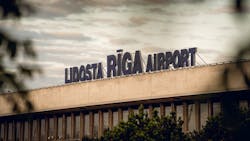Riga Airport Publishes Its Sustainability Report
Riga Airport has published its annual Sustainability Report, which summarizes the company's most significant work and events in 2020, when the aviation industry was hit hard by the crisis caused by the COVID-19 pandemic. Despite the decline in the number of passengers, the airport last year implemented significant infrastructure development projects and achieved the set goals to reduce its environmental impact.
Riga Airport is the largest air traffic infrastructure company in the Baltics and last year served 43% of passengers, 40% of flights, as well as 44% of the total cargo volume in the region, maintaining a stable leading position in the region. In 2020, there were 17 airlines operating at the airport, of which the largest share in terms of passenger numbers was carried by the national airline airBaltic (57%). Last year, 76 % of passengers arrived at Riga Airport on direct flights, whereas 24% were transfer passengers.
The airport's net turnover in 2020 was 29.8 million euros. Although the company's revenue fell by 54% as a result of the crisis, the airport paid EUR 11.38 million in taxes to the state budget last year.
Despite the difficult economic times, the airport continued the most important infrastructure development projects aimed at making the airport even safer and more environmentally friendly. The most important of these are the second rapid-exit taxiway and the taxiway lighting system built with the support of the Cohesion Fund, which will make it possible to optimize aircraft movements at the airport, thus reducing CO2 emissions.
The goals of Riga Airport in environmentally friendly and energy efficient management are set in the company's Environment and Energy Management Programme. Proof of the company's purposeful work in the field of environment is the second tier achieved in 2020 in the international Airport Carbon Accreditation (ACA) program. With the acquisition of the second tier, Riga Airport has joined the world's airports that are actively working to reduce CO2 emissions, contributing to the achievement of European climate neutrality goals. This year, the airport strengthened its commitment to climate neutrality by joining the ACI Net Zero 2050 initiative and committing itself to achieving a complete reduction in CO2 emissions from the Airport's directly controlled emission sources by 2050.
RIX Airport City development vision provides for growth opportunities at the airport for various industries, from tourism and hospitality to transport and logistics. At the heart of the airport's future vision is the new passenger terminal with a capacity of up to 12 million passengers per year, which will be connected to the Rail Baltica railway station, creating a single passenger service complex. Airport's business city or RIX Business Park will expand around it, incorporating hotels, office centers, logistics and cargo warehouses, providing development opportunities for a wide range of businesses and providing new jobs. The beneficiaries of the future Airport City will therefore also be the residents of the municipalities close to the airport.
The multifunctional cargo platform opened at the airport last year has become the basis of the future cargo service center RIX Cargo City; it allows to accommodate aircraft of various types and sizes and handle them in an efficient and environmentally friendly manner. Next to the new apron, the construction of the DHL regional complex was started at Riga Airport. The center is among the most advanced air cargo handling and logistics centers in the Baltics. In turn, the national airline airBaltic will supplement this center with a new cargo hangar Baltic Cargo Hub, which will be the largest cargo handling center in the Baltics.
“Today, airports are no longer just a place for aircraft to take off and land in order to take cargo and passengers to their destinations. Airports are business ecosystems that provide connectivity and open the door to new opportunities for both people and businesses. The company's purposeful growth arises in close synergy with the development of tourism and business throughout the region. Although the pandemic introduced significant adjustments to the aviation industry, our goal is to make Riga Airport an important regional air hub that promotes Latvia's economic growth by providing convenient and secure connectivity for passengers and business, creating jobs and business development opportunities. Sustainable and responsible management is the basis of this growth,” says Laila Odiņa, chairperson of the Board of Riga Airport.
Concern for the safety and health of workers and passengers was a key guideline for the launch in 2020 of a comprehensive epidemiological safety program called "Forbid the Virus from Travelling," which was also rated in August in the safety assessment by the prestigious aviation rating agency Skytrax COVID-19. The airport has also acceded to the European Union Aviation Safety Agency's COVID-19 Charter.
A significant achievement is the Platinum category in the Sustainability Index assessment, which Riga Airport has been receiving for the third year in a row; only 23 companies in Latvia managed to achieve it in 2021.
By starting work on a new Medium-Term Strategy for 2021–2027 in 2020, the company has defined that its operations are based on a responsible approach, analyzing and evaluating the impact of business decisions on all key aspects of sustainability: the environment, employees, society and the local community, as well as the economy. Thus, the principles of sustainability, which the airport has been applying in its daily work for many years, will be fully integrated into the company's development planning.
Riga Airport prepares its annual sustainability reports in accordance with the international Global Reporting Initiative (GRI) standard, and has identified passenger safety, employee safety and health, open and ethical management, training, skills and development as its most important aspects of sustainability, as well as infrastructure development.
More information about the achievements of Riga Airport and the full Sustainability Report is available www.rix-sustainability.lv.
